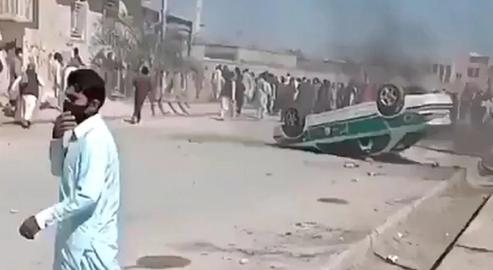This spring the fire of protest in Sistan and Baluchistan province have once again been reduced to ashes by state-sponsored violence, arrests and repression.
Since demonstrations broke out in Saravan in early March 2021, there have been sporadic reports of continued protests and arrests in the city. Why this is happening is lost on no-one – including the local police.
Information and statistics on the different faces of poverty and deprivation in Sistan and Baluchistan and other Sunni-majority provinces are not hard to find. The residents of these border provinces have been disenfranchised and under-served for 42 years.
Adding to this body of literature, Sistan and Baluchistan Police Quarterly published two long-form investigations last year on the destitution pushing locals into “illegal” behavior.
Poverty the Biggest Factor in Provincial Instability
The first study, entitled Study of economic development of border areas with a security approach, stated that the overall level of development in Sistan and Baluchistan was the lowest out of all Iran’s provinces.
The report stated that this, together with the province's marginal location, its mixed Shiite and Sunni population, the activities of armed groups, extensive borders with Pakistan and Afghanistan, the prevalence of profitable smuggling, frustration with local officials and most importantly of all, poverty, had weakened the security of the province.
“A lack of economic development,” the authors observed, “discrimination, and the unequal distribution of opportunities and capital in Sistan and Baluchistan province have challenged the security of the region.”
The study declared poverty and economic inequality the single biggest season for local insecurity. It also observed that Sistan and Baluchistan has the lowest rate of economic participation among the provinces of Iran. The authors recommended the authorities work to implement employment projects to reduce local instability.
Hard-Up Teenagers Drawn to “Criminal” Practice
In another study entitled Criminological investigation of fuel smuggling in Saravan, police in Sistan and Baluchistan province sought to address the practice of “fuel smuggling” in the very deprived city where the killing of a fuel carrier would lead to mass demonstrations in March 2021.
Conveying fuel across the Pakistan border, the paper said, was widespread in Sistan and Baluchestan province and a key source of income for border town residents. Or as the authors put: "The perpetrators consider fuel smuggling as an inseparable necessity of living in border areas and part of the life culture in these areas."
The report cited "price differences on the two sides of the border" and "unemployment and poor livelihoods" as the two principal causes of fuel carrying in Saravan. "In October 2020 in Saravan city,” it said, “a 70-liter container of gasoline, costed 210,000 tomans ($8.75) at the fuel supply point, at the subsidized price.
“The same container went for 350 thousand tomans ($14.58) on the open market and 700,000 tomans ($29.16) on the other side of the border."
The study went on to say: “Fuel smuggling is one of the most accessible sources of income for the unemployed in these areas, due to the lack of need for large initial capital or special expertise or experience.
“Many violators, who are reported to the Penitentiary Organization, state in their statements that their motive for committing this violation was living and subsistence problems."
The police also cited "cultural and social interdependence between the two sides of the border", "the family social culture," and "poor social control and oversight" as cultural factors contributing to the phenomenon.
"Many fuel smugglers, because of their familiarity or similarity across the border, easily carry their fuel cargo to Pakistan, and some of them, in addition to Iranian ID cards, forge Pakistani ID cards to facilitate the move of fuel," it added.
According to police, "Many smugglers try to take adolescents or young people with them when traveling long distances to avoid being alone or in need of help, which gradually leads to a culture of fuel smuggling among adolescents."
The police also claimed in the report that "The jurisprudential assertion of Sunni scholars that fuel smuggling is permissible, as opposed to drug or arms and ammunition smuggling" has led to the growth of this phenomenon in the province.
Police also cited "long borders", a "non-popularity of agricultural and livestock jobs", "low criminal risk" and "external gangs" as other factors contributing to the boom in fuel smuggling.
In another part of their investigation, police addressed the consequences of fuel smuggling in the province. The authors wrote that a significant number of students have chosen this job and this has in turn increased school dropouts.
A significant number of vehicles with unknown or fake license plates, an increase in fatalities due to accidents and various types of environmental damage were also listed among the consequences of fuel smuggling.
These consequences are the product of years of deprivation in Sistan and Baluchistan, due to the deficiencies and standpoint of an ideological Shiite central government which has marginalized Iran’s Sunnis and rural populations.
Related coverage:
How Did the Fires of Protest in Saravan Ignite?
Iranian Baluchis Protest Against the Shooting of Impoverished Fuel Smugglers
Wave of Executions of Baluch Iranians Horrifies Campaign Groups
Unemployment, Poverty and Executions in Iran’s Baluchistan Province
visit the accountability section
In this section of Iran Wire, you can contact the officials and launch your campaign for various problems


























comments